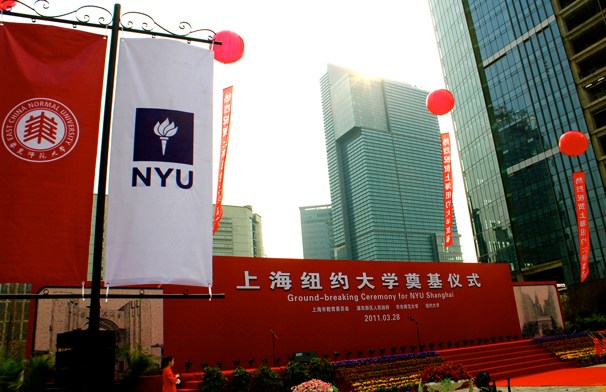Opinion: NYU Shanghai students’ detainment was absolutely political
NYU’s complacency and inability to protect its students from being used as political tokens is a disturbing and troubling precedent.
On March 12, nine NYU Shanghai students were detained in two separate drug sweeps by police officers. NYU students are just the latest victims in international tensions. (Photo by Casey Kwon)
April 29, 2021
On March 12, nine NYU Shanghai students were detained in two separate drug sweeps by police officers. WSN reported that two students were approached at a bar, while seven others were taken into custody at a birthday party in an off-campus apartment.
Anything relating to drugs is considered a serious offense in China. Users can face up to three years in prison, while drug traffickers are often executed. Foreigners, as in this case, are not exempt. China has frequently used such persecutions of foreign nationals to flex its growing geopolitical power. A result of NYU’s tacit complicity, its students are just the latest victims in the growing tensions between China and the West.
The Washington Post was the first to put forth the possibility that the sweeps were politically motivated, as they happened “amid worsening relations with the United States” and only several weeks before bilateral U.S.-China trade talks. In October of last year, Chinese officials warned that they could detain American citizens in response to the U.S. government’s prosecution of Chinese researchers. The Washington Post also drew attention to peculiar aspects of the sweeps, such as how the NYU students at the bar were approached by plainclothes police officers. Uncertain as to whether or not they were speaking with real police officers, both students were violently arrested as they attempted to leave the scene, with one being “kicked in the head” while the other “sustained bruising.”
NYU Shanghai disagreed with the Post’s assessment. Their perspective is that far from being malicious, the entire incident was simply an unfortunate occurrence. In an internal email to Shanghai students, the Shanghai Dean of Students, David Pe, denied the possibility of his students being targeted, stating that “the bar staff and bar patrons … were also detained in the drug sweep,” and that “the specifics of the drug sweeps were in-line with other drug-enforcement-related activity [they] are familiar with.”
However, it’s hard to believe that the sweeps weren’t politically motivated. Non-governmental organizations such as NYU haven’t been exempt from broader geopolitical tensions. Notably, in 2018, a Chinese telecommunications company’s Chief Financial Officer was arrested in Canada at the U.S.’s request, an act that led to the retaliatory detainment of two Canadian citizens by the Chinese government.
With this context in mind, the business-as-usual explanation that Dean Pe provides doesn’t make sense. It not only fails to address unusual aspects of the detainment, such as the officers involved being in plain clothes, but also doesn’t consider Chinese authorities’ ability to practice discretion. Just because Chinese authorities had the legal basis for such an aggressive detention doesn’t mean they had to exercise it. The fact that they chose violence, especially in the lead-up to trade talks with the U.S., marks the entire incident as political.
One can’t really blame NYU for wanting to deemphasize the significance of this incident. After all, their very ability to operate a campus in China is solely dependent on the whims of the ruling Chinese Communist Party (CCP). The CCP has often limited the activities of companies and institutions that refuse to adhere to its censors and values. As such, had NYU drafted a response contradicting the CCP’s right to detain its students, they would have undoubtedly faced repercussions.
This said, for an academic institution, the safety and wellbeing of one’s students should always come first, even if that means risking confrontation. It’s naive to think that NYU, with its “global community,” won’t be caught up in global tensions again. In response to these incidents, NYU needs to swiftly and decisively protect its students.
Yet, in this case, it seems they’re doing just the opposite. The language of Dean Pe’s email is passive and disturbingly muted. Rather than seeking to prevent future “situations,” Pe writes simply to let everyone know “that these situations can arise.” He refers to his students’ assault as their being “treated roughly.” The only call to action in the entire message is about “dispelling rumors.” His failure to truly acknowledge his students’ pain and deteriorating situation is disturbing and Orwellian.
In the long run, NYU’s complacency in this incident is a threat to its entire brand. If foreign nations are freely able to influence and otherwise co-opt NYU’s campuses abroad, using them as proxies by which to pressure the United States. The true accessibility and safety of NYU’s travel programs is called into question. As for NYU Shanghai’s campus, it seems as if NYU is choosing the prestige of having a campus in Shanghai over its students’ ability to have a safe and stress-free experience.
Opinions expressed on the editorial pages are not necessarily those of WSN, and our publication of opinions is not an endorsement of them.
Email Jack Li at [email protected].
























































































































































